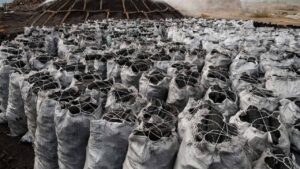The rise in cost of cooking gas is making homes revert to charcoal stoves thereby raising new concerns of the environmental impact of charcoal. With the latest trend of mass adoption of charcoal stoves for cooking in the country, it is important to consider the environment.

There has been a high cost of living since the past Buhari administration but it got to an all-time high with the emergence of Tinubu. Things have continued to get out of hand since the start of the Tinubu administration. Cooking gas has now become a luxury. Not just gas but several other items have become super costly. The revert to charcoal aside from making our utensils dirtier also holds even more concern for the environment.
The environmental impact of charcoal is more concerning given where charcoal comes from. Charcoals come from trees this means that most likely for every charcoal that burns either a tree is partly cut down or wholly cut down. This doesn’t seem to be sounding good for our environment. Charcoal stoves have many disadvantages, they burn to ashes and are mostly accompanied by dark soot. In many cases, charcoal use triggers deforestation and the release of CO2 into the environment.
Currently, Nigerians are trying hard to survive the current economic situation and while the environment is important, several individuals are not paying much attention to that at the moment; survival seems the priority now. Nevertheless, it is important to understand the potential impact of the mass adoption of charcoal stoves. It is possible that if the government or even individuals understand what is at stake, the mass migration back to charcoal stoves could be reconsidered.
Environmental impact of charcoal use
- Deforestation: Charcoal comes from wood. To obtain charcoal, trees are chopped down in part or whole. When this is done extensively it can lead to deforestation. Reducing the number of trees doesn’t sound so great. Trees are part of nature. They provide a kind of beauty to the environment. Also, deforestation may cause soil erosion and other natural disaster.
- Less Oxygen Supply: It should be understood that trees contribute to our oxygen supply. With less trees means that our planet will lose a substantial supply of oxygen. Protecting the trees is helpful to humans and other forms of life.
- Less Nutrient for the Soil and Release of Harmful Gases: Apart from oxygen, trees provide nutrients to the soil. When wood is converted to charcoal, combustion takes place and the resulting substances are ashes and gases. These resulting gases are harmful to the environment and the resulting ashes are not going to be enough to make up for the nutrients and other benefits that such trees provide.
- Threat to natural habitats of other creatures: It is also important to understand that trees are also a form of shelter for wild animals. These animals are important to the environment. Destruction of such animal’s environment makes them vulnerable. This can pose dangers to such creatures.
- Reducing food source: Trees are a source of food. This may not always be about humans alone but several animals rely on trees and other plants for survival. With reducing trees comes a reduction in food availability especially in the wild. By protecting the trees we protect all of nature.
- Trees are a form of life: Apart from the environmental impact of charcoal use and other disadvantages that may come with the destruction of trees which may arise when we continue making high use of charcoal, it must be understood that trees are a form of life. They should be protected as much as possible to live through their life cycle. While it is tough to prove whether trees have feelings, cutting them prematurely doesn’t seem like the best thing to do. If there could be an alternative, reducing the use of charcoal is very important.
Disadvantages of the use of charcoal for cooking
Apart from the environmental impact of charcoal, there are other disadvantages of charcoal use for cooking. These disadvantages of the use of charcoal for cooking include:
- Dirtier utensils: charcoal is dark, and even when used most carefully, it has a high chance of making your utensils and kitchen dirtier.
- Smoke irritation in the eyes and inhalation: Using a charcoal stove increases the chances of irritating smoke in the eyes or even inhaling charcoal smoke. When this happens constantly and in huge inhalation quantity, it could potentially pose health challenges.
- It is harder to get the fire started: With a charcoal stove, a lot of effort is needed to get the fire started. When the charcoal is wet, this could be another issue entirely. With gas or kerosene stoves, a single spark is enough to get the fire burning, it takes a lot more than that with charcoal.
- Tougher to regulate: The burning of gas or kerosene stoves can easily be lowered, with charcoal however the regulation is tougher.
Despite these disadvantages and other concerns of the environmental impact of charcoal, it also offers some advantages. The primary advantage pushing Nigerian homes to embrace charcoal currently is affordability. Compared to gas or kerosene currently, charcoal is more affordable.
Conclusion
Irrespective of whatever reasons Nigerians are now reverting to charcoal stoves, something needs to be done to improve the standard of living of the people so that extreme measures will not be resorted to by the people. Mass adoption of charcoal stoves currently given the high population of Nigeria can trigger a negative impact.
The environmental impact of charcoal should be taken seriously by the government and homes. The government needs to find ways to make cooking gas more affordable for the people so that homes don’t have to rely on charcoal.
You May also want to Read About: Ozone Layer Protection Day; Creating More Awareness.
 Home
Blog
Home
Blog